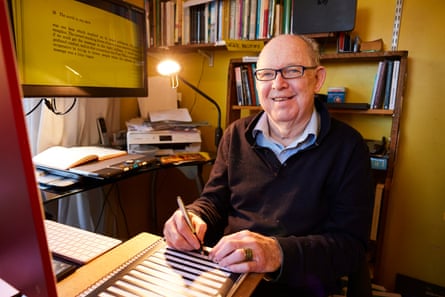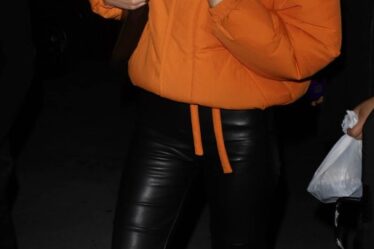
In 2019, Roger Cowell realised he was losing his vision. “When I was on holiday in Japan, one day I woke up and everyone’s faces had no features,” he says. “It was terrifying. As my sight deteriorated, it was like I was sitting in a dark room waiting for someone to turn the lights back on.”
He returned to the home he shares with his wife, Heather, in West Yorkshire and underwent tests to diagnose a genetic condition that was causing his central vision to disappear. By February 2020, he could only see through his peripheral vision and had to rely on help. “I was fiercely independent and I had to try to accept this new world,” he says. “I needed to find a different way to live.”
The learning curve was steep. Cowell, 72, who is a retired nurse, describes tumbling down the stairs several times and breaking his ribs, as well as smashing glasses or dropping food from his plate. Outside, things were even more dangerous. In April 2020, he was walking with his cane along a local canal towpath when he heard a cyclist rushing towards him. He instinctively jumped out of the way, but landed in the water.
“My survival instinct kicked in and I managed to scramble to the bank to pull myself on to the towpath,” he says. “It was traumatic – I could have drowned. There must have been a reason why I didn’t, and that was when I started trying to make sense of what happened to me through writing.”
Unable to sleep one night, Cowell made his way downstairs, found a notebook and pen, and started to write – even though he couldn’t read what he was putting down. “I wrote for three hours nonstop, describing everything that had happened and giving it a timeline,” he says. “While it was tough reliving it, I realised I had survived and that I would continue to. It felt like a release.” In the morning, he showed Heather, who found it surprisingly legible. “It got me writing more and more,” he says.
Since that night, Cowell estimates he has written more than 250,000 words. He has completed a set of essays on the lessons he’s learned since becoming partially sighted, as well as a blog from the perspective of his walking cane and another nonfiction piece about the hallucinations he had when he first started losing his sight. The boundary between vision and reality is also the premise for his novel about a partially sighted man’s journey into a fantasy world.
He still writes longhand on paper, using a screen reader to make sure he is sticking to the lines, before having it transcribed and read back for editing by assistants. “I just can’t stop myself. I often joke that my wife has to book appointments to see me between my writing and editing,” he says. Growing up in New Zealand, he had always enjoyed writing stories: “When I was 10, my teacher said I’d become a writer and finally I have.”
Cowell trained as an anthropologist and worked in the Pacific Islands, before relocating to the UK in his early 20s. He then worked as a nurse for 30 years before undertaking freelance academic research projects in public healthcare. He always loved reading, enjoying everything from Margaret Atwood to Chimamanda Ngozi Adichie, but it took the loss of his vision to reconnect to his early love of writing stories. “Adult life got in the way, but now I’ve found a rich vein of experience to write about,” he says. “It’s something I want to keep doing.”
Although he has found it difficult to reach out to agents because of his accessibility needs, Cowell is still keen to find a way of publishing his work. “I’m proud of what I’ve achieved in writing and in adapting to this new world,” he says. “No matter your setbacks, you have to find ways to still enjoy life if you can. I think other people might find something to take away from this experience too.”
With a sequel to the novel planned and more nonfiction under way, it seems Cowell won’t be putting down his pen anytime soon. “I could never have imagined the world that I experience since my sight changed,” he says. “It’s a story worth sharing.”



